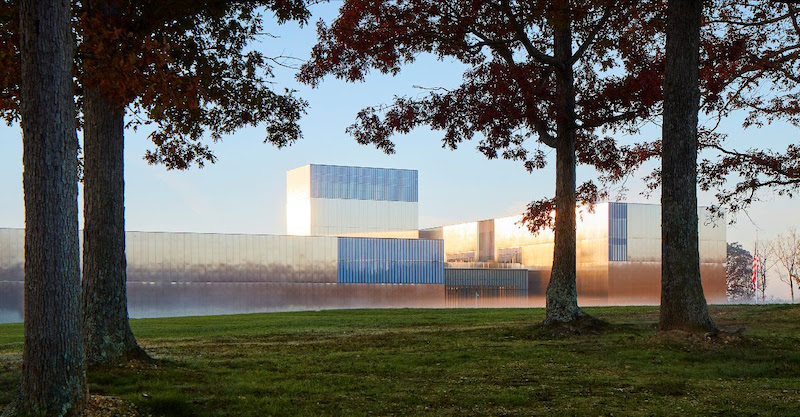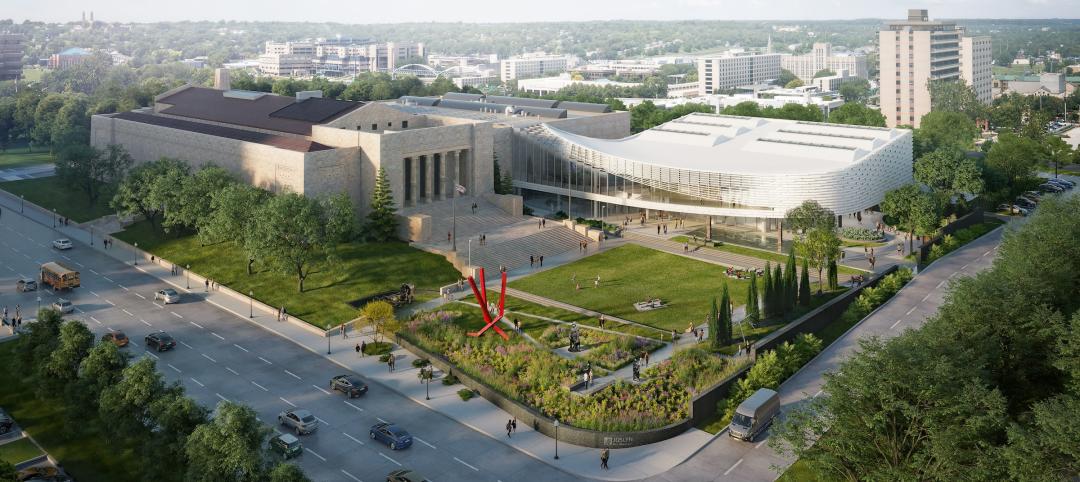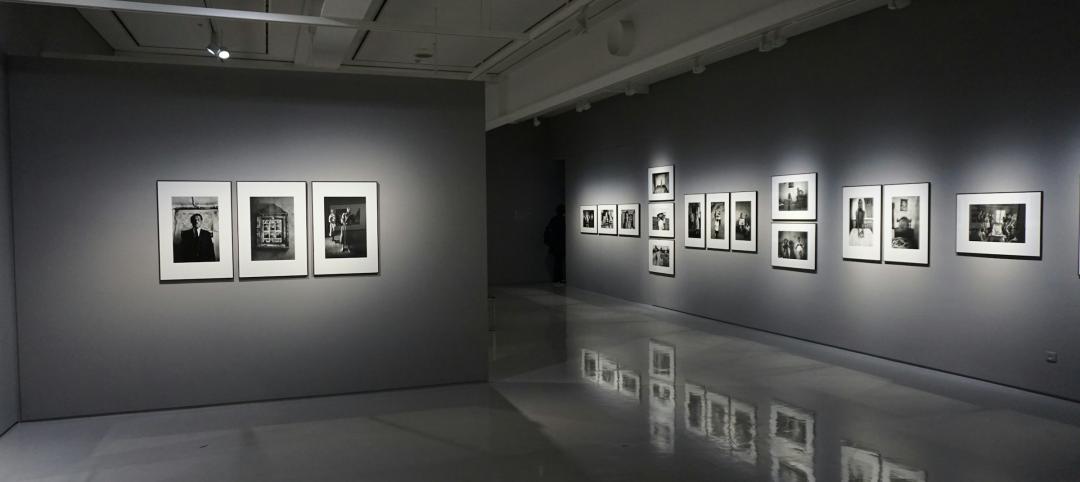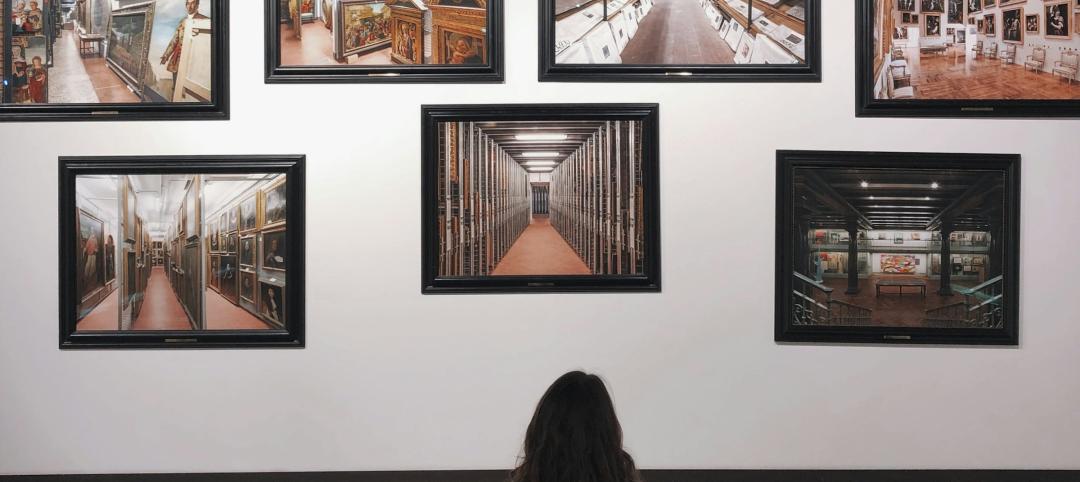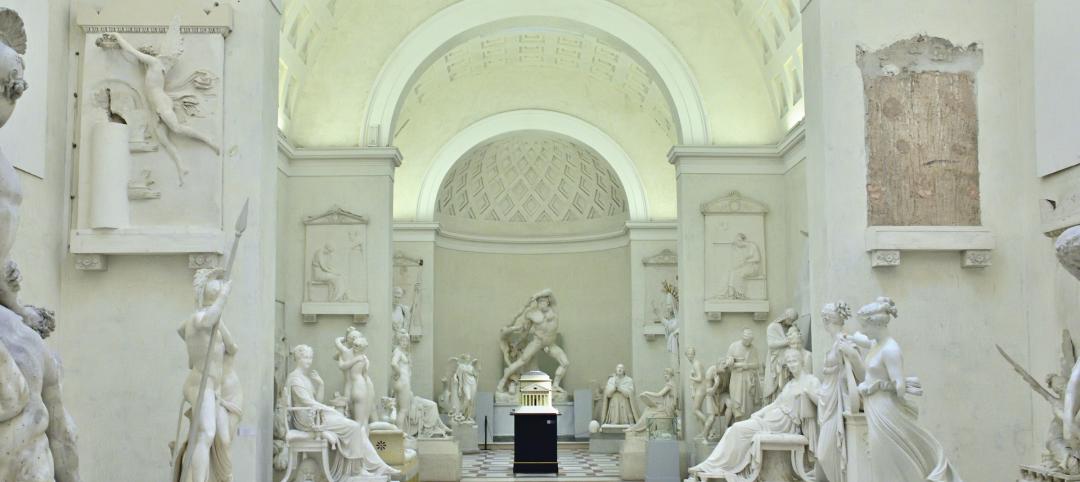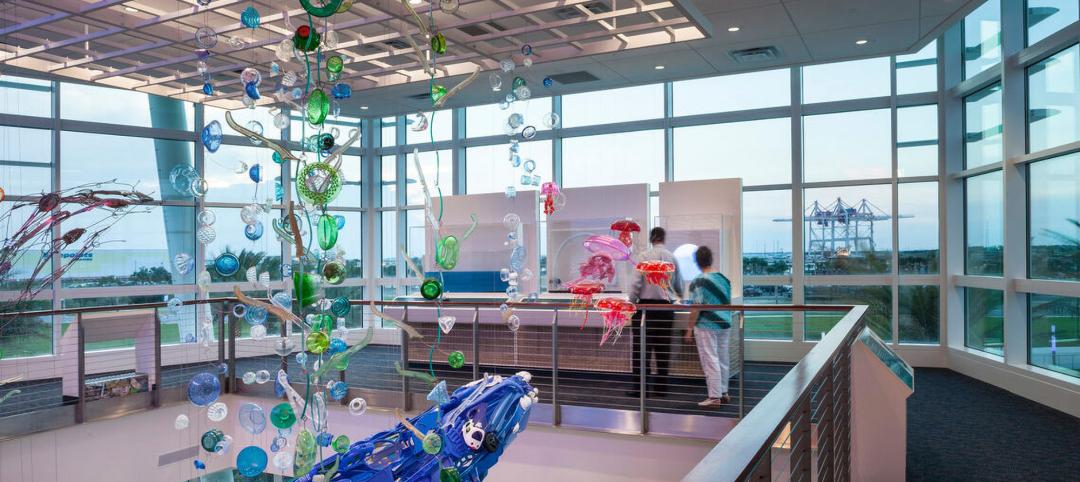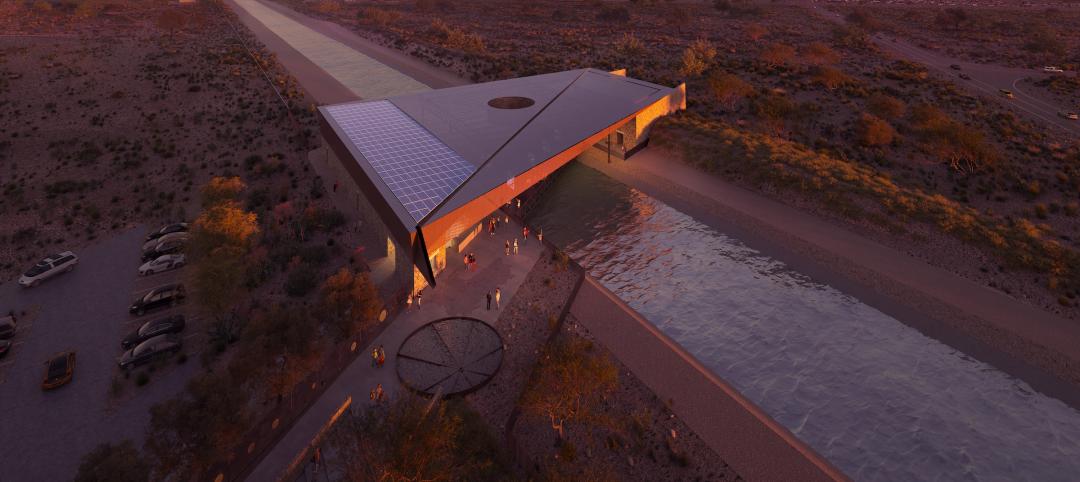The National Museum of the United States Army (NMUSA), a cultural institution that is the first to tell the story of the oldest branch of the United States military, recently completed and opened on Veterans Day.
Located 20 miles outside of Washington, D.C., the facility is designed to serve as a center of education, and the symbolic front door of the Army. The museum focuses on the individual soldier, not battles or wars, to tell a centuries-long narrative of honor, sacrifice, and valor.
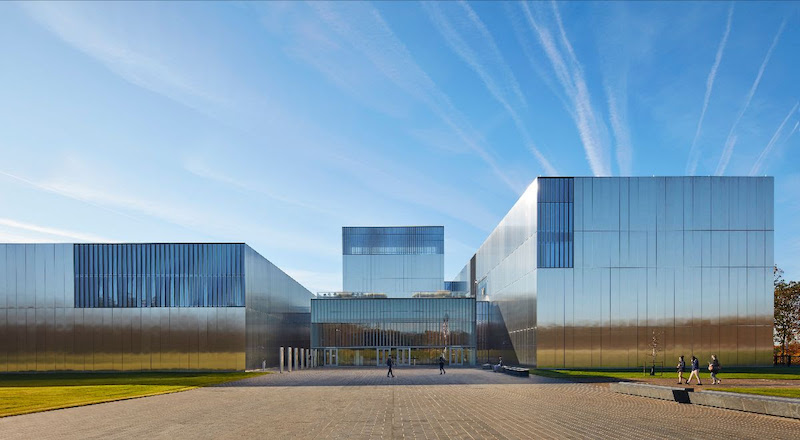
The LEED Silver-certified museum spans 84 acres across the Fort Belvoir Military Installation in Virginia and comprises a series of pavilions for exhibits and special events. The building leverages the site’s natural topography and rests atop a plateau to evoke a sense of monumentality. SOM’s design and planning for the future of the site includes a quiet memorial garden, a parade field and grandstand, and an Army Trail with interpretive stations.
Symbolism is at the core of the museum’s design. The symbolic experience begins with the access road, which offers a glimpse of the stainless steel-clad museum through the tress and across a long meadow. The museum rises to 100 feet at its peak, and its facade is composed of a regular grid of laser-cut stainless steel panels that establish a sense of rigor and discipline that are central to the design. At the corner of each pavilion, recessed glass panels alternate with painted aluminum fins to add a sense of dynamism. The complex lies on a three-foot grid system with every joint and edge of the building falling on each subdivision with precision, meaning the aluminum fins are spaced 18 inches apart to fall exactly on the edges of the panels.
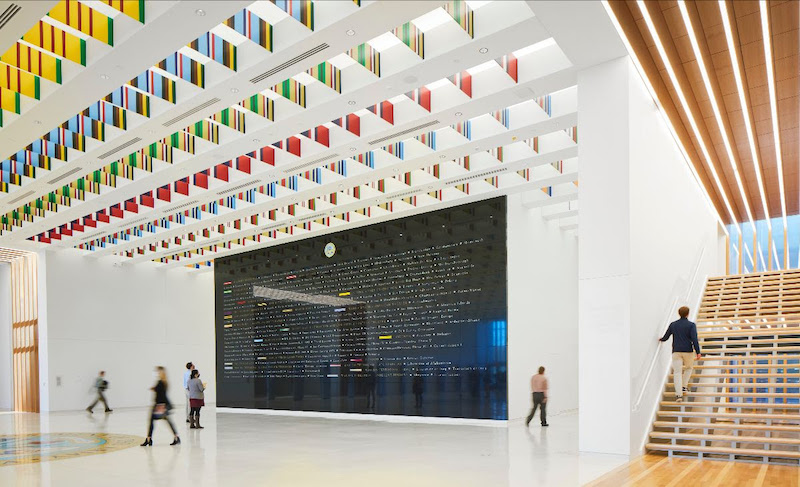
Inside, the symbolism continues with stainless steel pylons sharing individual soldier stories and leading visitors from the promenade, through the vestibule, and into the exhibition hall. The grand lobby, which can be used as an event space, includes the Department of the Army’s emblem inscribed on the terrazzo floor and a black granite wall that lists every campaign from the Army’s history. Above, a coffered ceiling with 22 rows of translucent, laminated glass panels match the colors of the campaign streamers from the Army’s past.
See Also: First rendering of the National Medal of Honor Museum unveiled
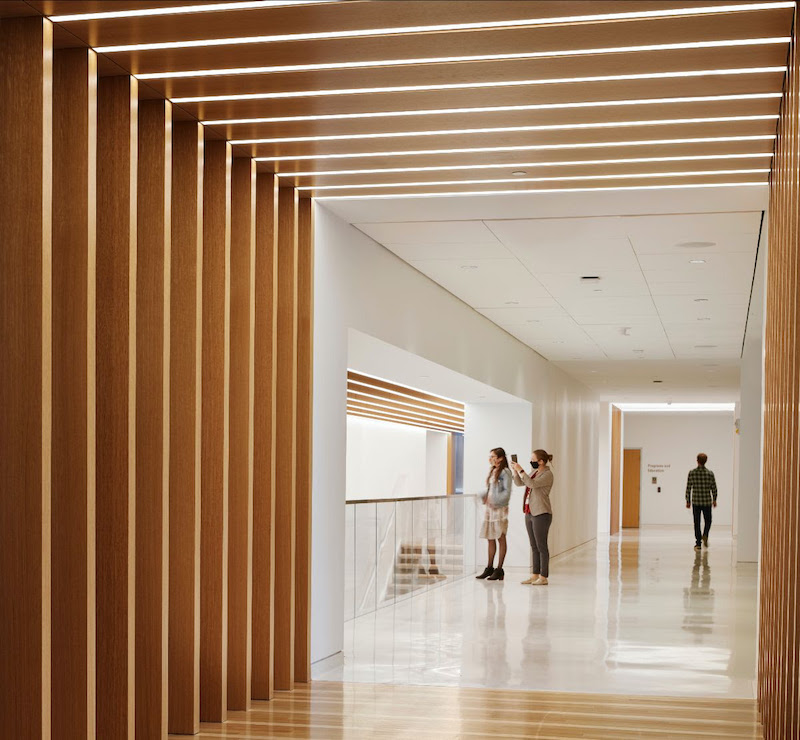
Retail, a cafe, the first of three landscaped terraces, and exhibition spaces including a 300-degree theater surround the lobby. A monumental staircase leads visitors to additional exhibition spaces on the second floor.
Glass and wood thresholds connect each pavilion to signify transitions between spaces and provide views outside. On the third floor a wood-clad Veterans’ Hall serves as an event space supplementing the lobby. The Veterans’ Hall connects to the Medal of Honor Garden. Here, a 10-foot-tall black granite wall is engraved with the names of every medal recipient.
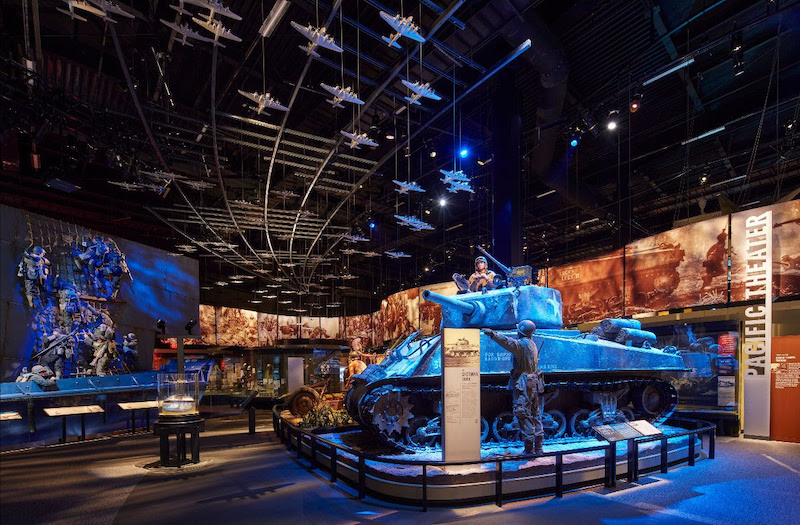
Sustainable features include increased insulation, improved glazing, high-efficiency LED lighting, automatic daylighting controls and occupancy sensors, and a green roof.
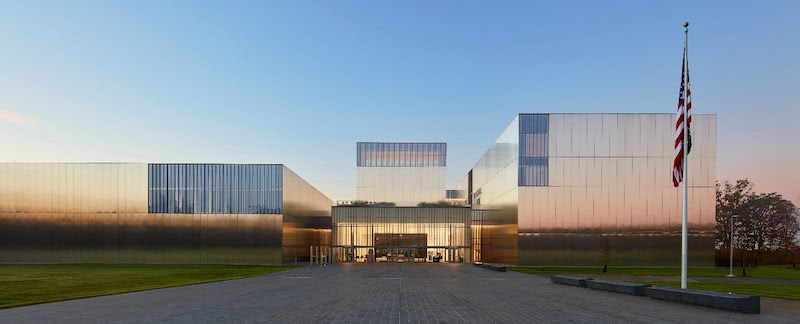
Related Stories
Museums | Mar 25, 2024
Chrysler Museum of Art’s newly expanded Perry Glass Studio will display the art of glassmaking
In Norfolk, Va., the Chrysler Museum of Art’s Perry Glass Studio, an educational facility for glassmaking, will open a new addition in May. That will be followed by a renovation of the existing building scheduled for completion in December.
Museums | Mar 11, 2024
Nebraska’s Joslyn Art Museum to reopen this summer with new Snøhetta-designed pavilion
In Omaha, Neb., the Joslyn Art Museum, which displays art from ancient times to the present, has announced it will reopen on September 10, following the completion of its new 42,000-sf Rhonda & Howard Hawks Pavilion. Designed in collaboration with Snøhetta and Alley Poyner Macchietto Architecture, the Hawks Pavilion is part of a museum overhaul that will expand the gallery space by more than 40%.
Products and Materials | Feb 29, 2024
Top building products for February 2024
BD+C Editors break down February's top 15 building products, from custom-engineered glass bridges to washroom accessories.
Giants 400 | Feb 8, 2024
Top 40 Museum Construction Firms for 2023
Turner Construction, Clark Group, Bancroft Construction, STO Building Group, and Alberici-Flintco top BD+C's ranking of the nation's largest museum and gallery general contractors and construction management (CM) firms for 2023, as reported in Building Design+Construction's 2023 Giants 400 Report.
Giants 400 | Feb 8, 2024
Top 40 Museum Engineering Firms for 2023
Arup, KPFF Consulting Engineers, Alfa Tech Consulting Engineers, Kohler Ronan, and Thornton Tomasetti top BD+C's ranking of the nation's largest museum and gallery engineering and engineering/architecture (EA) firms for 2023, as reported in Building Design+Construction's 2023 Giants 400 Report.
Giants 400 | Feb 8, 2024
Top 70 Museum Architecture Firms for 2023
SmithGroup, Gensler, Ayers Saint Gross, Quinn Evans, HGA, and Cooper Robertson head BD+C's ranking of the nation's largest museum and gallery architecture and architecture/engineering (AE) firms for 2023, as reported in Building Design+Construction's 2023 Giants 400 Report.
Museums | Jan 30, 2024
Meier Partners' South Korean museum seeks to create a harmonious relationship between art and nature
For the design of the newly completed Sorol Art Museum in Gangneung, South Korea, Meier Partners drew from Korean Confucianism to achieve a simplicity of form, material, and composition and a harmonious relationship with nature. The museum is scheduled to open on February 14. It is the firm’s first completed project since restructuring as Meier Partners.
Sponsored | BD+C University Course | Jan 17, 2024
Waterproofing deep foundations for new construction
This continuing education course, by Walter P Moore's Amos Chan, P.E., BECxP, CxA+BE, covers design considerations for below-grade waterproofing for new construction, the types of below-grade systems available, and specific concerns associated with waterproofing deep foundations.
Museums | Jan 8, 2024
Achieving an ideal visitor experience with the ADROIT approach
Alan Reed, FAIA, LEED AP, shares his strategy for crafting logical, significant visitor experiences: The ADROIT approach.
Cultural Facilities | Nov 21, 2023
Arizona’s Water Education Center will teach visitors about water conservation and reuse strategies
Phoenix-based architecture firm Jones Studio will design the Water Education Center for Central Arizona Project (CAP)—a 336-mile aqueduct system that delivers Colorado River water to almost 6 million people, more than 80% of the state’s population. The Center will allow the public to explore CAP’s history, operations, and impact on Arizona.


